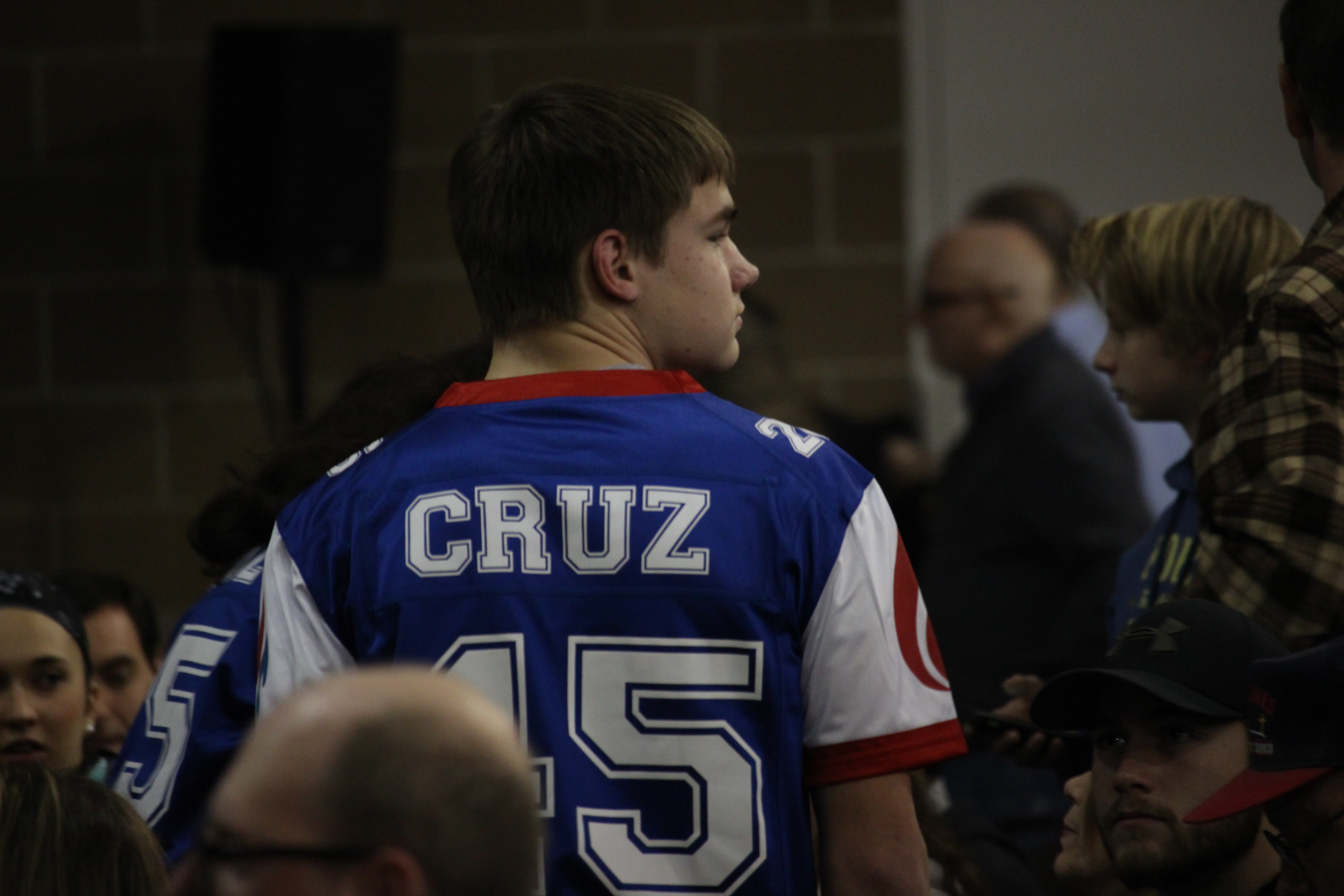
Des Moines — On the Thursday before the Iowa caucuses, Carl Miller, 17, from Downers Grove made the five-hour, 311 mile trip to Iowa missing three days of school to volunteer for U.S. Sen. Ted Cruz (R-TX).
“I made roughly 550 calls my first day,” Carl said.
Well spoken with a passion for politics, Carl said he admires the work Cruz has done, like fighting against illegal immigration and fighting against Obama Care. “Senator Cruz has been the most consistent conservative, he’s a man of integrity, a man of his word.”
Chicago resident Payden Hall, 21, who came in for the weekend, said there were volunteers at Cruz’ headquarters who quit their jobs, so the least she could do was spend a weekend volunteering. As she was on her way out the door Sunday afternoon to continue canvassing for the Texas senator, Hall said she had already knocked on roughly 100 doors and was looking for more.
The Cruz headquarters, located in Urbandale, in a tiny strip mall just north of West Des Moines, was filled with more than 60 people making phone calls and speaking with media, while groups gathered outside, some in prayer and others eager to continue working.
Inside, a cluster of tables and phones were situated in the center and against the wall with people of all ages making calls on the senator’s behalf. A small kitchen in the back was home to snacks and boxes of pizza pilled high with Cruz posters covering the walls.
This dominating ground game proved that a traditional campaign is the key to winning Iowa. When the final results were announced on Monday, Feb. 1, Cruz won with 28 percent, political newcomer Donald Trump came in second with 24 percent and Florida Sen. Marco Rubio placed third with 23 percent. On the Democratic end, Hilary Clinton and Bernie Sanders were locked in a virtual tie, with Clinton at 49.9 percent and Sanders at 49.6 percent.
Gayle Herron, another Illinois resident who had been staying at Camp Cruz for the week, said this was her first time volunteering for a political campaign.
“I’m here to represent the evangelicals, I just had a calling to support Cruz,” Herron said.
A surprise addition to the already hectic spectacle, was Texas Lt. Gov. Dan Patrick. The key to Iowa, he said, was to see who could get their voters out.
“Unlike primary states where you can vote at anytime, caucus states like Iowa are a multi-hour commitment,” Patrick said. “You can’t take an operation like this for granted; between yesterday and today, HQ will make roughly 40,000 or more calls.”
One thing Cruz, the Holy Crusader from Texas has done differently than his counterparts is run a traditional ground campaign, a model he took from his senate run back in 2012.
“When you run a successful ground operation in Texas, that’s the equivalent to five, six even seven other states,” Patrick said.
Later at a packed rally of more than 800 supporters and volunteers located at the Iowa State Fairgrounds, the senator spoke briefly about what he would do on his first day if elected president. Among those were ending the persecution of religious liberty, getting rid of the “catastrophic” Iranian nuclear deal and not weaken, but utterly destroy ISIS.
Caucus night can bring some confusion to those new to the practice. On the Republican side, the process is fairly easy compared to Democrats. With Republicans, a traditional anonymous vote takes place, the votes are tallied and the results posted. On the Democratic end, a designated precinct captain wrangles support for their candidate by speaking and persuading individuals to join their group. If a group does not have more than 15 percent, they are considered not viable. Another round of talking and persuading takes place until a group gathers enough support to reach the viability threshold.
But winning the Hawkeye State doesn’t guarantee victory in November, especially when it comes to Republicans. Rick Santorum in 2012 and Mike Huckabee in 2008 each won Iowa, but neither won their party’s nomination yet alone the White House.

Monday night in precinct 55, located on the third floor of the Iowa State Historical Building, 208 caucus goers and a handful of media waited patiently in a tiny room for the event to get started. After the votes were cast, it was Rubio who won with 88 votes, followed by Trump with 37 and Cruz at a mere 10.
At a caucus site east of Ames, Carl Miller spoke of a different outcome.
“In 2008, this caucus site had 20 people come out; in 2012, 60 or so; this election we had 105, and 44 voted for Cruz.” It’s early February, though, and Iowa has more than 1,600 predicts across the state, these are only two of them.
On his way to the Cruz victory party Carl said, “When you win the early states, it helps build momentum for the rest of the campaign.”







Be First to Comment